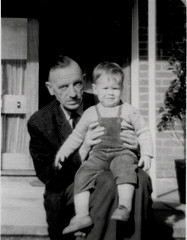My Criminology and Penology tutor once asked why we don’t punish children. We students started scratching our heads and, before we all choked to death in a blizzard of dandruff, he gave us the answer: children don’t know right from wrong.
That answer sat uneasily with my own experience as what I remembered of my childhood was dominated by regular updates from my parents about just how naughty I was being. I think kids generally do know what is naughty and what isn’t without too much prompting but what they don’t appreciate is just how serious the consequences of their actions can be.
I might as well confess immediately: I was a juvenile delinquent. I went through a phase which started somewhere after my third birthday and came to an end somewhat after my fourth. Like most criminals I began with some mindless vandalism. My friend Nigel and I were playing in the background when he spotted that the Big Bad Wolf had appeared in Mrs Devis’ garden next door. We crept to the chain link fence and satisfied ourselves that it was him. He seemed to be sniffing the air as yet unaware of our presence. Of course he might have been pretending not to see us. As the stories we heard at Nursery School made perfectly clear, he was a devious creature.
We looked around the garden for the weapons that we knew we would need. There was a pile of half bricks that seemed ideal. With as much stealth as a three year with a half-brick can muster, we crept to the low chain-link fence that divided our garden from Mrs Devis’ and hurled the bricks as hard as we could. They plopped into the Mrs Devis’ beautifully-maintained lawn a few inches beyond the fence. The Big Bad Wolf was unharmed but now roused and vengeful. Panicked, we ran back for more ammunition. Over the course of half an hour or so of staggering and lobbing, the pile of half bricks had clunked and bounced its way onto the lawn next door and the Big Bad Wolf was vanquished. We headed off for tea awarding each other imaginary medals for bravery.

(Portrait of a Serial Killer – that’s me on the right)
An hour later I was confronted by my irate father who had been on the receiving end of a lengthy and vividly worded complaint from our neighbour. He was discinclined to accept that we had acted in self-defence and that Mrs Devis’ garden had, for a short while, been home to child-eating wolf of notorious cunning and terrifying dentition.
Where were our parents whilst we were saving lives with building materials? The answer is that they were sat in each other’s kitchens smoking and talking which is all parents ever seemed to do in those days. Children were put out the door and left to get on with things to an extent that would terrify modern parents and have social services patrolling the suburbs with a big net. Usually we got onto our little bicycles, found a hill with a base thick with nettles and let nature take its course.
One consequence of this enforced community of the tiny is that you had no real choice with whom you played. One child in our street was particularly unwelcome: Jane East. In the first instance Jane was a girl and any little boy knew that that was unforgivable. They were soppy and obsessed with ponies. They tended to break things and tell tales. Jane was not just a girl; she was a noisy, bossy girl. We made a deputation to our parents and asked to be spared any further visits from Jane and received a pithy lecture about the need to get on with each other and not to interrupt the smoking and the gossiping without a very much better reason.
This left us with no choice but to take matters into our own hands. Jane would have to go. My first thought was the red berries on the bush at the front of the house three doors down. They were a bright red and, when crushed, squirted out a dirty yellow paste that we had been warned would lead to instantaneous death if eaten. We offered some to Jane. She looked at them dubiously. It took perhaps 5 minutes of persuasion. She lifted one to her lips and we held our breath. She bit at it and our eyes-widened. Nothing happened. She tried another. Nothing happened. She consumed them by the handful and nothing happened. Foiled.
Then we had another idea. If you put soap in water and stirred it hard, it looked like milk. Or at least it did for a few seconds before it separated like curds and whey. Mum found us gathered around the sink looking guilty. She eyed us supiciously and asked us what we were up to. “Washing our hands, Mum” I said. She knew that couldn’t be true but all the evidence seemed to point in that direction. Four pairs of young eyes gazed back at her. She shook her head, sighed and went back to cigarettes and coffee in the kitchen. I stirred as hard as I could and then ran to Jane whom we had left sat on the front lawn. “Here – drink this” I urged “It’s milk”. Jane may have been as irritating as wire-wool underwear but she was no idiot. She harumphed and went back to smashing toy cars with a rock leaving us standing thwarted and clutching a cup of soapy water.
Then came the call for tea and off we trotted. Fish fingers and beans for everyone and my career as killer was over before it had begun.
Â
Average Rating: 4.7 out of 5 based on 252 user reviews.
